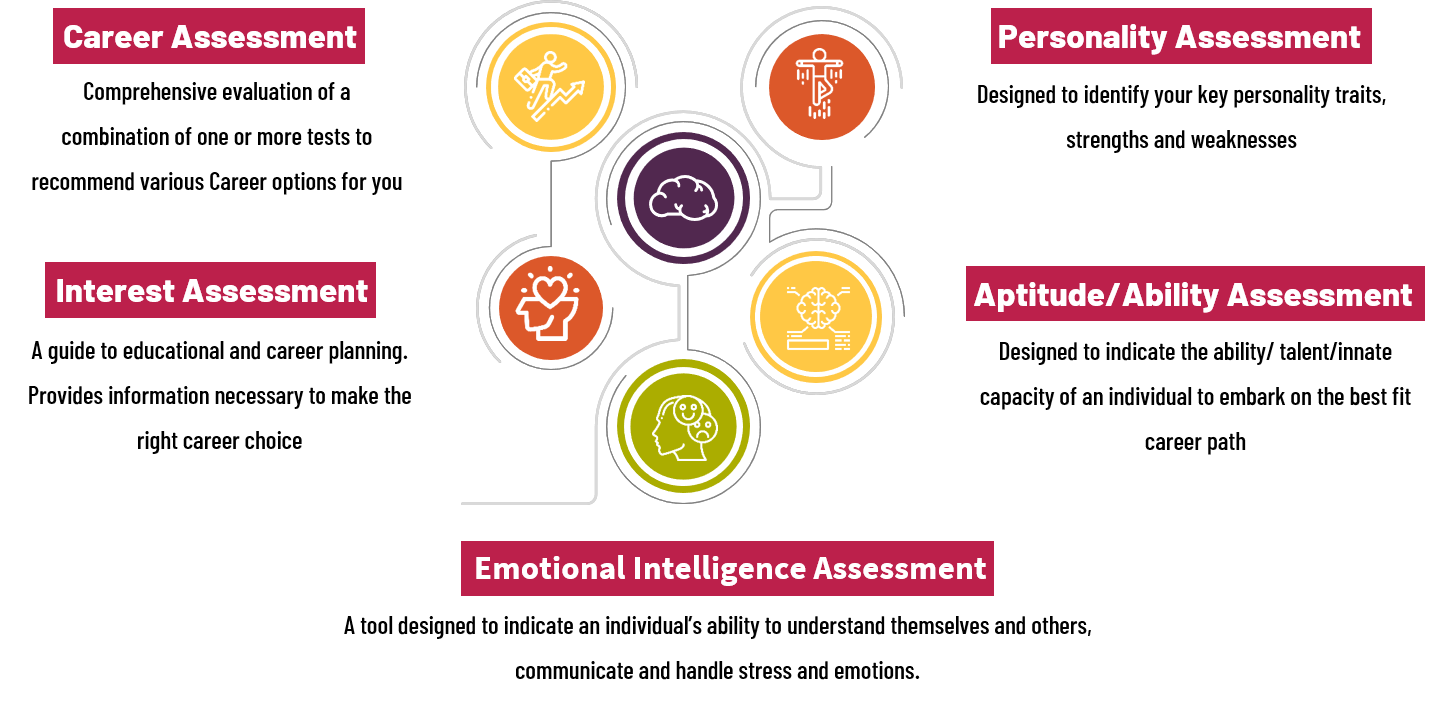
Today there are innumerable career paths available. While there is no shortcut for hard work to achieve success in any field, in today’s world, it is important to know ourselves well. Knowing ourselves includes knowing our strengths, weaknesses, our beliefs, our personality, our thinking style, our capability etc. Knowing ourselves well enables us to maximise our potential, utilise our strengths, and overcome our weaknesses. This will further help us to use our hard work and intelligence in the right direction in order to build knowledge and skills required for successful careers, of our choice.
At Strelitzia Consulting, our endeavour is to guide you with various career options to enable you to make a well-informed career decision.
Strelitzia Consulting’s Career assessment and guidance program begins with a battery of tests consisting of a combination of Personality, Interest, Aptitude/Ability and Emotional Intelligence tests. The combined results from one or all of these tests are evaluated to recommend various Career options for you.
Personality is the combination of characteristics or qualities that form an individual's distinctive character. There are different character traits that make one’s personality. Some examples of character traits that come together to form our personality are Sincere, stubborn, funny, hard worker, learner, team player, enthusiastic, creative, short tempered, passionate, dedicated, Honest, kind, patient, trustworthy, Polite etc. Every individual possesses both negative and positive character traits. This test enables one to identify key personality traits, strengths and weaknesses.
The interest test is a guide to educational and career planning. One can tell a lot about a person based on their interests and what suits them. If the profession chosen connects with these interests, one is likely to find a lot more pleasure in their work. The interest test provides information necessary for making the right career choice.
Aptitude as the actual ability or talent or an innate capacity to perform a physical or mental act, whether or not acquired by training and education. In other words, the ability to perform a chosen physical or mental act can be acquired by training and/or education if not naturally bestowed! Aptitude also denotes the readiness or quickness in learning. An aptitude becomes a capability when it reaches its maximum effectiveness point with optimum training.
Every career option requires an aptitude/ability combination that should match with the individual’s potential ability to grow with that career. These tests give an indication of the current aptitudes/abilities of the individual. While these give an indicator of where the individual stands at a particular point of time, guidance is provided to improve/maintain the right aptitude/ability combination to embark on the best fit career path.
Emotional Intelligence refers to the ability to identify and manage one’s own emotions, as well as the emotions of others. Just like in adults, children also need emotional intelligence in their lives to respond to external situations in a balanced way and also to manage their own emotions. Having emotional intelligence gives them the ability to understand themselves and others, communicate and handle unpleasant feelings. A high EQ (Emotional Quotient) can help them deal with poor marks, peer pressure and academic demands at the early stage. Later in life, this could mean having the ability to handle success, failure, work pressure, and professional and personal relationship with depth and composure. Many researches indicate Emotional Intelligence (EI) as a good predictor of career progression – an employee who is socially and personally aware of his surroundings will perform better. Raising EI does not happen overnight; It starts in the early years. It can be imbibed with practice, support and some tools and techniques. EQ improves with time, focus, consistency, and commitment – We have the tools and expertise to guide you in all this and more.
Every student learns differently. Some find the reading and writing routine perfectly interesting, while some learn and recollect more effectively through experiences, activities, and visuals. There are four main learning styles- visual, auditory, reading/writing and kinaesthetic. Understanding which category or a combination of categories your child falls into goes a long way in enhancing their performance. What’s more, it can make learning fun.
Understand your child’s learning styles to maximize school and self-learning. Enhance their learning capabilities by getting trained on using multi learning styles, choosing effective study methods that complement their strengths rather than work against them.